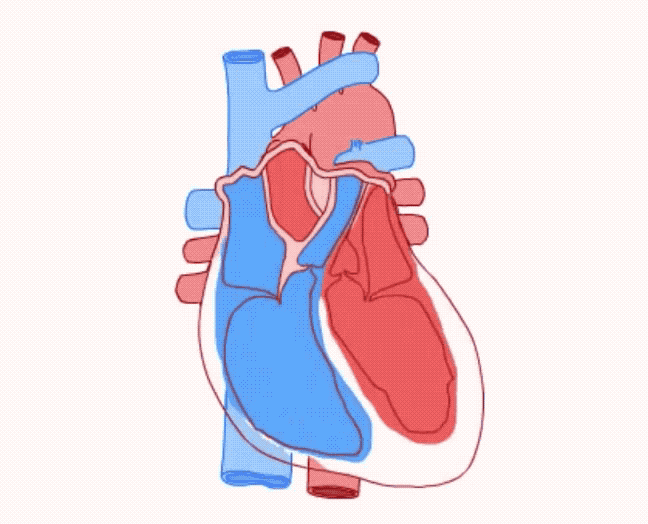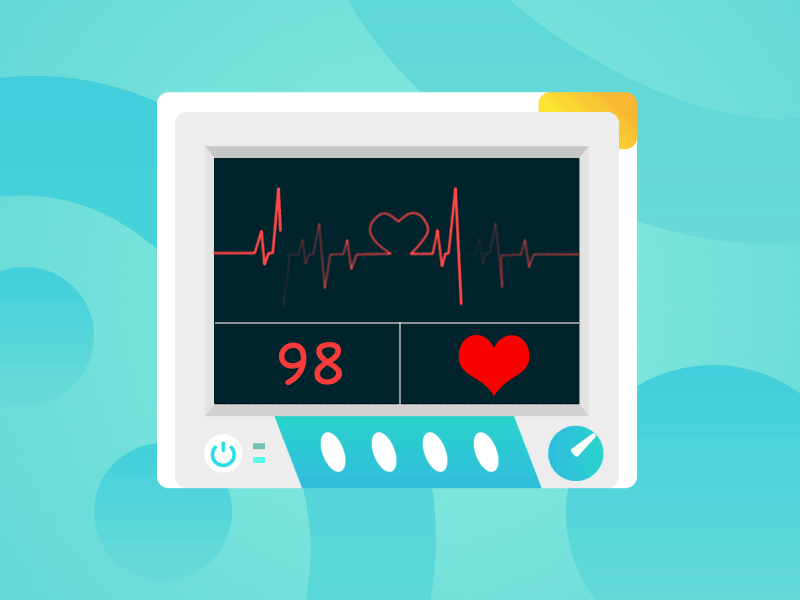
The heartbeat is 80 beats per minute, which is normal for ordinary people. But for hypertensive patients, this heart rate is considered “excessive” and even requires the intervention of a cardiologist.

For people with hypertension, what is the most appropriate heart rate control?
people with hypertension, even if the heart rate exceeding 75 is fast
Many hypertensive patients have the characteristics of increased sympathetic nerve excitability, which is manifested by increased heart rate.
On the one hand, the rapid heartbeat and increased cardiac output will activate many hormones in the body, leading to increased blood pressure; on the other hand, sympathetic nerve excitement will shorten the diastolic time of the heart, reduce myocardial blood supply, and cause myocardial damage and disease.
◉heart beat measured in the clinic > 80 times/min
When measured in the clinic, if the resting heart rate is higher than 80 beats/min, it is recommended that the patient take home resting heart rate measurement to eliminate the white coat effect.
Heart beat higher than 75 beats/min measured at home
The heart rate of multiple family self-tests at different time points in the resting state is all >75 beats/min, which can also be regarded as an increase in heart rate.
When the resting heart rate is> 80 beats/min, doctor intervention is required.
So, how many times is the best heart rate for hypertensive patients?
Ordinary hypertensive patients: when the heart rate is greater than 85 beats/min, the risk of cardiovascular disease will be greatly increased. When the resting heart rate is 60 to 70 beats/min, the risk of cardiovascular disease is the lowest.
Hypertension combined with coronary heart disease: The resting heart rate is controlled at 50-60 beats/min, which is considered to have the lowest risk of cardiovascular disease.
Hypertension combined with heart failure: The resting heart rate needs to be controlled at 60 to 69 beats/min to ensure the lowest risk.
The vast majority of hypertensive patients can control their heart rate at 60 to 80 beats per minute.
However, the elderly with arteriosclerosis and patients with insufficient blood supply to the brain should not control their heart rate too low.
It is recommended that hypertensive patients who are usually easily excited, or patients with a fast heartbeat, and menopausal women, try to avoid using drugs that will increase heart rate.
Among the commonly used antihypertensive drugs, blood vessel dilation drugs, especially short-acting calcium antagonists, tend to increase the heart rate while dilating blood vessels and should be used with caution.
Even if you use long-acting calcium antagonists, you must pay attention to changes in your heart rate. If necessary, you can be confirmed by your doctor, and you can use drugs that slow your heart rate together to counteract the resulting rapid heartbeat.
People with a slower heartbeat live longer
The total heartbeat of a human being is about 2.5 billion times in a lifetime. Compared with a person with a heartbeat of 60 beats/min, a person with a heartbeat of 90 beats/min will beat 300 million more times in 20 years, and the heart load will be greater.

Excluding smoking, high blood pressure, high cholesterol, diabetes and other high-risk factors that can easily cause cardiovascular disease, the heartbeat of a healthy person should be about 60 beats per minute after lying down for 5 minutes.
More than 70 beats per minute is considered fast, and the average life expectancy may be reduced by 4 months for every more heartbeat.
People with heartbeats of 70 to 89 beats/min have an average life loss of 3 years and 6 months.
90 to 99 times/min, life loss 8 years.
More than 100 times per minute may shorten the life span of 13 years.
Fast heart rate is an important factor in shortening life expectancy.
Long-term slow heart rate is not good, it will cause the heart to “pump” insufficient blood, leading to hypoxia and ischemia in the human body. In severe cases, it may die suddenly, or even die in sleep. Therefore, if your heartbeat is less than 50 beats/min, you must go to the hospital for a detailed examination.
Exercise to reverse the disadvantage of heart rate
Genes, daily life, eating habits, and whether the body is often in a state of acute or chronic inflammation may all affect the heart rate.
As long as the heart rate has not reached the level of illness, there is no need for panic and treatment, and this disadvantage can be reversed through exercise. Wen Qibang’s research found that among people with a heartbeat of 80 to 89 beats per minute, those who exercise regularly live 5 years longer than those who do not exercise.

It is recommended to walk for 15 minutes a day at a speed of two steps per second, and pay attention to the following exercise techniques.
1. Warm up before you start
For example, stretching, twisting and twisting the waist, let the muscles fully relax. You can also walk slowly for 5 minutes to allow the blood to flow through the legs fully to achieve the effect of warming up, and then gradually increase the walking speed. Leave 5 minutes before the end of the walk, slowly slow down, and don’t stop immediately.
2. Bend the elbow 90°
When walking, the abdomen is slightly retracted, the neck and spine should be in a straight line, and it is best to look straight ahead and avoid looking down.
The shoulders and arms are relaxed, the elbows are bent 85°~90°, and the palms are cup-shaped. The arms swing back and forth naturally, but the height should not exceed the shoulders. Don’t deliberately increase or decrease the stride length. Use a relaxed and effortless distance.
3. Avoid carrying heavy objects
Weight-bearing will increase joint pressure. When walking, you can carry up to a bottle of water, a towel, and a sun hat. You can carry a backpack, and the shoulders are evenly stressed, and it is not easy to cause the bones to tilt.
4. The amount of exercise is gradual
At first, you can walk for 15 minutes a day and exercise at least 5 days a week. From the second week, it can be increased to 20 minutes and gradually increase to more than 30 minutes a day.
5. Don’t force yourself
Don’t put too much pressure on yourself during exercise, it is important to keep your body and mind relaxed. No matter what kind of exercise, as long as you move, it will have the effect of prolonging life.
Comments